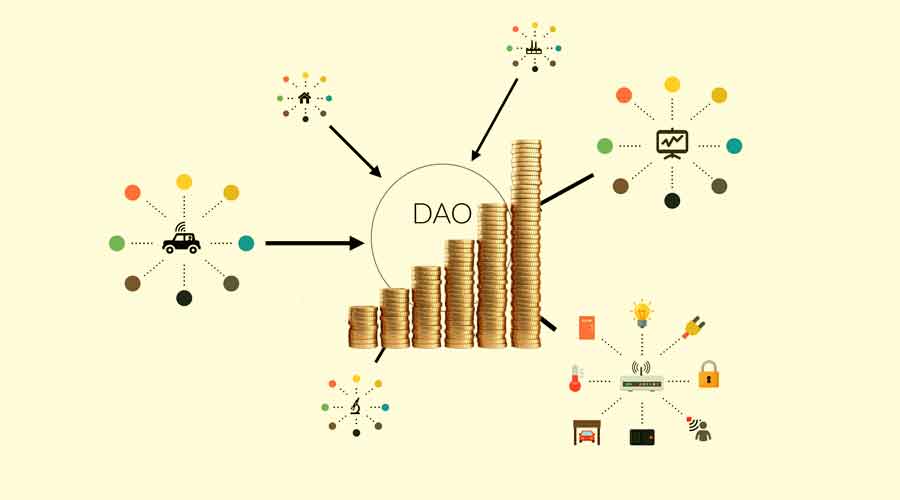 How Investment DAOs work, making them a simplified guide that can be beneficial for beginners
How Investment DAOs work, making them a simplified guide that can be beneficial for beginners
An Investment DAO, or Decentralized Autonomous Organization, is a digital investment vehicle that increases investment capital and further invests it on the basis of voting majority of DAOs members. A code is emanated from Investment DAO using blockchain technology. This code represents formal investment structures or informal investment clubs. Smart contacts containing it’s structure, rules for governing and ownership rights are deployed to a blockchain which is accessible to all members. This smart contract deployment creates a Governance token which is DAO’s own native token.
Usually DAO investors will deposit crypto in DAO’s inventory. While using Ethereum, the crypto deposit will take the form of $ETH, whilst using Polygon, $MATIC, and when using Solana, $SOL. These tokens, which will provide the holders voting rights, are given to the DAO investors once they deposit their money in the treasury. They cast their votes “on-chain,” which means that the results are added to the blockchain. The outcomes of these judgments are programmatically enforced, and they cannot be disregarded or changed.
Investment DAOs offer total transparency by recording every transaction to and from the treasury on a blockchain that is accessible to any DAO member. Those taking part in a venture capital firm as an LP (Limited Partner, for example, an investment in the VC itself) sometimes do not see hidden fees, murky bookkeeping, and honest mistakes. Investment DAOs’ democratized feature may aid in decentralizing fundraising. With the typical investor landscape, a select few sources provide the majority of the money for projects. In addition to making it difficult for initiatives from marginalized areas or regions to acquire money, this can result in undesirable power concentrations.
Investment DAOs democratize access to investing, which may lead to a positive feedback loop where typically under-represented investors can now invest in under-represented individuals, companies, communities, and regions. Last but not least, investment DAOs provide additional advantages like cost reductions and risk diversification. Investors can diversify their risk across several asset classes and various projects by making an Investment DAO investment, lowering their exposure to any one project failing. The move toward digital assets and financial vehicles provide a fresh method to invest, but it is not without danger.
Many DAOs are reluctant to accept funding from Americans who are not authorized investors since SEC restrictions still apply in the realm of DAOs. Some people may ask, “Are Investment DAOs legal?” in light of this. Yes, it is the solution. But they still have to adhere to the same legal requirements that other American investment entities do. The fact that the DAO is decentralized does not excuse you from carrying out your own due diligence when formulating ideas and casting votes for cryptocurrency projects or any other initiatives that are put up for consideration.
Investment DAOs differ from conventional methods of generating capital and financing investments in a few significant ways.
- They are decentralized, which means they are not governed by a single entity.
- They are autonomous in the sense that the investors themselves set the guidelines and make the financial choices pertaining to how the capital is handled.
- As a result of its programmatic organization, the code can be readily audited to see if it complies with various financial rules.
Here are 5 of the real-world verticals where Investment DAOs are already being used to interesting ends.
- Real Estate: An Investment DAO can be used in real estate in myriad of ways. One, by utilising it as a funding for a new project. Second, by building a real estate portfolio and investing in properties. Investors can buy tokens which represent the ownership of the portfolio. Then these tokens can be traded to earn profit.
- Crypto Projects: The most typical use-case for Investment DAOs is the funding of crypto projects. Often, these projects are themselves decentralized organizations that are building Web3 properties and infrastructure. This is a space where the DAO members choose to invest as they are usually well-aligned (and well-networked) with the space they are investing in.
- Entertainment Industry: Music lovers could be able to invest in a record or tour through an investment DAO and then split the proceeds once they are published. In addition to offering fans an opportunity to support their favorite artists, this would provide musicians a method to generate money for their projects.
- Startup Funding: The potential of Investment DAOs to democratize startup finance is yet another fascinating application. Startups may easily solicit investment from worldwide anonymous investors by posting their proposal on the DAO website. This makes money available to everyone with a strong idea, regardless of geography or social standing, and allows for a far more democratic approach. Additionally, investors from all around the world have access to early-stage businesses that they would not otherwise have.
- Intellectual Property Rights Management: It takes a lot of time and effort to handle intellectual property rights and licensing agreements. However, Investment DAOs can assist in streamlining payment procedures and lowering operating costs for groups of people who are striving to generate and, ideally, sell their works.




